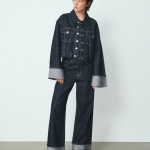In the diverse medley of Tokyo designers, Takeshi Kitazawa is something of an outlier, operating on a philosophical plane that few others tread. He has spent the last two seasons working with the theme of Self Portrait, deeply pondering the irreconcilable nature of reflection and self-awareness. “When we look in the mirror every day, we’re recreating ourselves over and over again,” he said by way of explanation over a Zoom call. “Your hairstyle might look the same, but maybe one hair will be different.”
This time he’d taken Stéphane Mallarmé’s seminal poem “Un coup de dés jamais n’abolira le hasard” (“A throw of the dice will never abolish chance” ) as a point of inspiration. “Words change a little from when they’re in your head to when you speak them,” said Kitazawa. “And I was encouraged by the poem because it’s about adjustments, so that even when things may look the same, they aren’t the same at all.”
It makes more sense when you see the clothes. Kitazawa designs with extraordinary sensitivity, updating his monochrome tailoring with the tiniest changes each season, tweaking the pattern of a jacket here or using a new fabric there. It’s a meditative, slower approach to fashion (continuing on from last season, he will only make a tightly limited run of ready-to-wear pieces) which feels refreshing in the industry’s increasingly frenetic and commercialized landscape. A pair of inky black trousers from his previous collection, for instance, returned as the first look of this one, but they’re not quite the same.
A winking sexuality often crops up in Kitazawa’s work too, and this season it came through in metal nipple brooches (cast from real life!) on the coolly cut jackets, and in the barely-there translucent tulle which both covered and revealed the body beneath, and onto which were threaded words from the Mallarmé poem. Viewed from afar, the model in look 5 is wearing what appears to be a necktie, but which on closer inspection is her skin contrasting against the straight lines of the white shirt. “Jackets are meant to cover up your body, so I purposely tried to bring out the details of the person inside,” he explained.
Kitazawa describes DressedUndressed’s aesthetic as mukishitsu, a Japanese word which is difficult to translate into English but that can mean inorganic, or coldly artificial. (Kitazawa himself, on the other hand, is an exceedingly warm nature-lover.) It’s as good an example as any, perhaps, of a reflection that can come close but never quite touch: whether from native language to foreign one; from human designer to inhuman creation; from the person we are in front of the mirror to the terminally unreachable self beyond.



